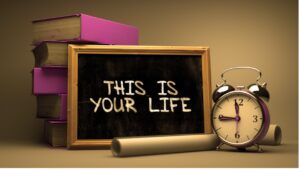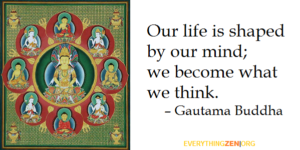Objectives
- Most of us intellectually understand that the only moment we have in life is this very one. That is it.
- Being in medicine for over 40 years has shown me the incredible unpredictability of life. Life changes in second – sudden heart attack, bad car accident, diagnosis of terminal cancer, and the list is endless.
- But our minds play tricks on us by constantly worrying about the future and hanging onto regrets from the past.
- This problem arises from our unconscious mind that is protecting us. It is continually scanning the present looking for situations from the past that were perceived or were actually dangerous.
- So, your actions today are a result of your cumulative perceptions of what is safe – or not.
- You can’t control this response but by using tools to stay connected to the moment, its impact is lessened.
Commitment to change is one thing but sticking with it is challenging. One way to help yourself along is to bite off small bits at a time and proactively make the choices all day long. It will become a habit and your norm. A starting point is repeatedly asking yourself a simple question, “Who do I choose to be today?”
A tough start to my day
One morning I woke up feeling low, having just completed eight straight 15-hour workdays, including a long weekend. As I lay there exhausted on a Tuesday morning, I reviewed my choices: either 1) stay in bed feeling sorry for myself; or 2) give thanks for the opportunity to help so many patients during the week, be grateful for how well the week went, and meet my work-out group early at the gym. I chose the second alternative. I got up, worked out, went into the office, and gave 100% to each patient and my staff. I’m not saying it was easy; but it turned out to be a great day.

Proactively choosing how to experience your day is the farthest thing from “positive thinking.” No one is asking you to pretend to be happy when you are coping with a difficult situation, especially your ongoing pain. On the contrary, you must be aware of the depth of your frustration before you can choose to live a full and productive life with or without pain – or decide to enjo. Positive substitution—filling your life with positive experiences— is the essence of neurological reprogramming.
A Tough Beginning
Recently, I was talking to a friend’s teenage son. This kid was good-looking, athletic, and personable; yet he felt isolated, insecure, anxious, and emotionally unstable. He continually compared himself to others and tried to fit in. He was also justifiably upset about his family situation. His father, who was extremely critical of him, had essentially abandoned him by moving out of the country. I understood where he was coming from, since his experience was not much different from mine at his age.
About halfway through our conversation I realized that he too, had a choice. I pointed out that, after years of stress, he had remained remarkably intact. He could choose to be proud of his resilience in the face of adversity and use this gift to take on new challenges. I could see his eyes light up.
Some suggestions
FOMO (Fear of Missing Out) seems to be rampant in this modern era. Maybe it is because we are overwhelmed with options? What we are missing out on is enjoying our day. It is a deeply embedded thinking pattern that doesn’t resolve over time. It requires specific approaches.
You can’t “solve” FOMO. By trying not to be this way, you’ll actually reinforce these circuits. The answer lies in cultivating connection, meaning, and purpose. Trying to be “happy” actually doesn’t work due to the “ironic effect.”1
- Nurture deep gratitude for you have. It may not be as much as you want but focus on it.
- Compare your situation to those who are less well off than you. It may not seem possible in light of your pain but start somewhere.2
- Become aware of how frantic you get about your “to do” list and how endless it is. It is endless for all of us.
- Then don’t put ANYTHING on your list that you are not going to do TODAY.
- Frequently practice active meditation or breath work to calm yourself. It is one tool that connects you to the moment you are in.
- Listen to some of your favorite music – especially if it is connected to enjoyable experiences from the past.
- What is one thing you can do today that brings you pleasure? – a cup of coffee your favorite donut; a call to a close friend; a compliment to a family member or friend; anything. There is an endless of list of small deeds that can change your day.
Recap – Your choice
What do you want out of your life? Is it more than being a sufferer enduring pain? Do you really want to live your one life this way? Of course not, you may be thinking. But trust me. It is unlikely that you will magically wake up one morning and find your troubles gone. Focusing on solutions is an ongoing conscious choice because your powerful unconscious brain automatically gravitates towards the problems. There are no shortcuts.
So, who do you want to be today? Choose carefully because you will either be reinforcing old neurological circuits or creating new ones. What is your choice this year, this month, today, the next 15 minutes, or this minute? Carve a few minutes out every morning to ask yourself that question, ponder your options, and commit to whatever choice you make.

Questions and considerations
- The impact of chronic pain on your life has been documented to be that of having terminal cancer – except worse.3 So, first of all, honor your own suffering and give yourself a break.
- Depending on the severity of your suffering, you may not feel like nurturing a better life, even for a few minutes. This is one point in your journey that you must begin somewhere, and the next 10 minutes is the place.
- Then you have to keep repeating it, whether you feel like it or not.
- Even when you are feeling better (and it will happen with practice), you’ll still gravitate towards the negative because that is what your powerful unconsciousness brain is supposed to do – protect you from danger.
- To have a good life, you have to live a good life. It is just the way your nervous system works.
References
- Wegner DM. The seed of our undoing. Psychological Science Agenda (1999); Jan/Feb:10-11.
- Dalai Lama. The Art of Happiness. Penguin Random House. New York, NY, 1998.
- Fredheim OM, Kaasa S, Fayers P, Saltnes T, Jordhøy M, Bortchgrevink PC. Chronic non-malignant pain patients report as poor health-related quality of life as palliative cancer patients. Acta Anaesthesiol Scand (2008); 52:143-148.
